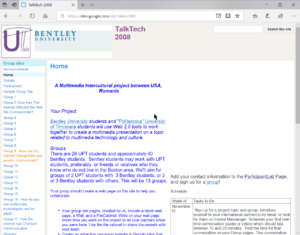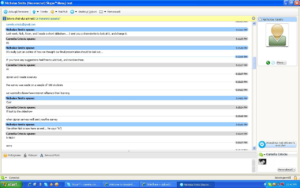Students discuss social media apps and websites.
2010: Moving to the Cloud
2011-2012: Web 2.0 Entrepreneurship
2018 – Digitial Reality and Culture
Read the project description.
2009 Examples
Video Conferencing
The version of the video on YouTube is better than the version that I had to upload via Movie Maker. In the video you first see the view from Lissie’s computer, which offers sound and explanation of what we are doing- mainly using the white board and embedding a YouTube video about DimDim. The second part shows the view from my screen, without sound, so I added a little background music
. It shows what the whiteboard and YouTube video look like, as well as the DimDim conferencing screen. Unfortunately, Florian didn’t have a microphone, but you can see his face on the view from my screen, as well as our chat on the right side of the screen. Elena didn’t have a webcam so unfortunately she could not participate.
http://www.youtube.com/watch?v=A3AlF6eYd9A
2008 Examples
2017 – VR and Cultural Exchange
o enter the video we want to connect with. It was quickly created when all steps are done. Therefore, our group really like Roar.
For the VR project we used the cospaces.com. To use the cospaces we had to upload the 360 degrees photo or the panorama and after uploading, we were able to add moving object and word bubbles which made the project easy and fun. We also really enjoyed using the cospaces.com
First of all, thank you for this great collaboration. I would love to see more of this kind of projects, because working with people from other country is not an easy task, but it is an interesting task and we learned how to communicate with our colleagues in the US.
Projects are great opportunities to learn new skills. One of the most important things that I learned comes from project failures. There are many reasons a project can fail and all of them are opportunities for learning. I learned what augmented reality and virtual reality means, what applications we use to create them. The applications we used is Roar for AR and CoSpaces for VR. Augmented reality enhances one’s current perception of reality, whereas in contrast, virtual reality replaces the real world with a simulated one.
Presentation at EDEN 2016
Diana presented the paper “Enhancing Creativity and Opening Up Learning Through Virtual Mobilities” at EDEN 2016 in Budapest.


